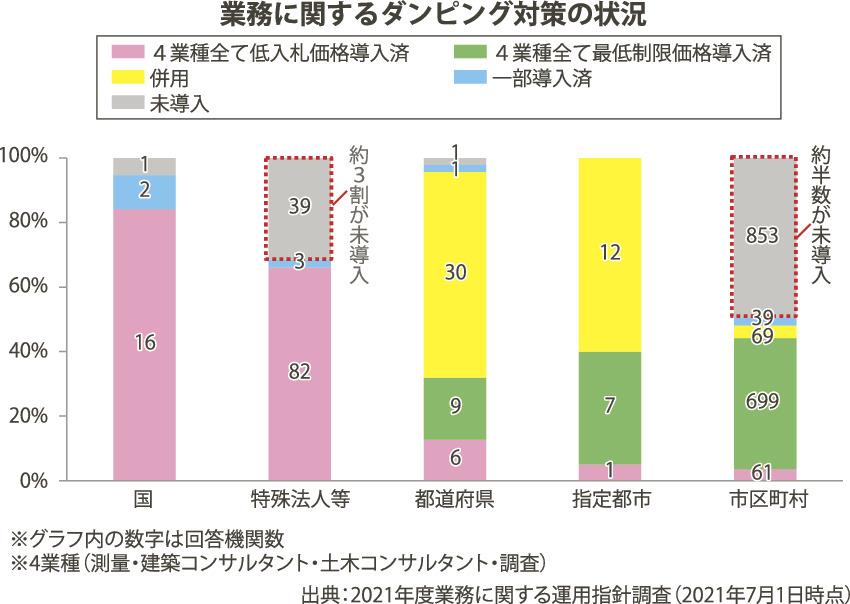Business dumping measures, improvement progress in municipalities / Ministry of Land, Infrastructure, Transport and Tourism survey

The Ministry of Land, Infrastructure, Transport and Tourism will strengthen the efforts for dumping measures for municipal ordering operations. According to the fact-finding survey as of July 1, 2021, municipalities that have not introduced the low bid price survey system or the minimum limit price system account for about half of the total. Based on the situation that improvement has not progressed compared to the construction work in which both systems have almost penetrated, the policy is to "visualize" the actual introduction of both systems in a form that can be compared with neighboring local governments by the end of the fiscal year. It will also be a major agenda item at regional meetings attended by contractors from local governments.
The results of the FY21 survey of surveying, surveying, and design work based on the operational guidelines of the Public Works Quality Assurance Promotion Law (Public Works Quality Assurance Law) were announced on the 14th.
Dumping measures are almost widespread in the national government, prefectures, and government-designated cities, but about 50% of municipalities (895 groups in the previous year) have not introduced either system. Although it can be said that it is in the process of improvement, it is still at a low level considering that the introduction of the system in construction has reached 1640 groups (as of October 1, 2009), which is about 95%. About 31% of 39 organizations (42 organizations) such as special public corporations have not been introduced yet.
The ratio of the number of cases for which the performance deadline was set in the 4th quarter of the ordering business in FY2008 is ▽ country = 83.4% (83.5% in the previous year) ▽ special corporations = 55.6% (58.0%) ▽ Prefectures = 64.2% (66.3%) ▽ Ordinance-designated cities = 69.6% (67.9%) ▽ Municipalities = 58.7% (58.1%). It has been almost flat since the previous year.
Investigate whether or not standards and guidelines have been established for operational reference as indicators for securing the fulfillment period and design changes. Including cases where the standards and guidelines of other organizations are applied mutatis mutandis, the fulfillment period is 90% or more in prefectures, 70% or more in municipalities, and design change is 80% or more in prefectures, and in municipalities. More than 50% operated the standards and guidelines. We also investigated the introduction status of bidding contract methods other than price competition, and found that the introduction rate of the comprehensive evaluation method was less than 10% in municipalities.
The survey results are disseminated through the orderer council for each block, the supervision section chief council, and the prefectural public works contract business liaison council. It appeals that the appropriateness of business ordering work is indispensable for improving the quality of construction work.






